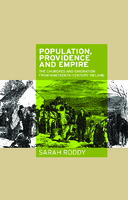Population, providence and empire
The churches and emigration from nineteenth-century Ireland
Abstract
The book knits together two of the most significant themes in the social and cultural history of modern Ireland - mass emigration and religious change - and aims to provide fresh insight into both. It addresses the churches' responses to emigration, both in theory and in practice. The book also assesses how emigration impacted on the churches both in relation to their status in Ireland, and in terms of their ability to spread their influence abroad. It first deals with the theoretical positions of the clergy of each denomination in relation to emigration and how they changed over the course of the nineteenth century, as the character of emigration itself altered. It then explores the extent of practical clerical involvement in the temporal aspects of emigration. This includes attempts to prevent or limit it, a variety of facilitation services informally offered by parish clergymen, church-backed moves to safeguard emigrant welfare, clerical advice-giving and clerically planned schemes of migration. Irish monks between the fifth and eighth centuries had spread Christianity all over Europe, and should act as an inspiration to the modern cleric. Tied in with this reading of the past, of course, was a very particular view of the present: the perception that emigration represented the enactment of a providential mission to spread the faith.
Keywords
Christianity; churches; clergy; clerical advice-giving; emigrant welfare; faith; Irish monks; mass emigration; nineteenth-century Ireland; parish clergymen; religious changeDOI
10.7765/9781526147226ISBN
9781526147226OCN
1126207258Publisher
Manchester University PressPublisher website
https://manchesteruniversitypress.co.uk/Publication date and place
Manchester, UK, 2019Grantor
Classification
History and Archaeology
c 1500 onwards to present day
Migration, immigration and emigration
Relating to migrant groups / diaspora communities or peoples


 Download
Download Web Shop
Web Shop